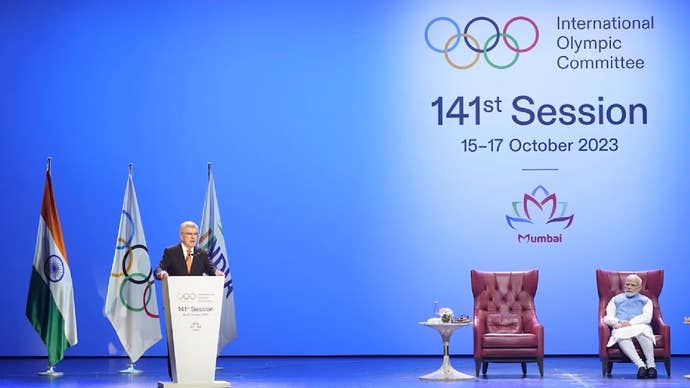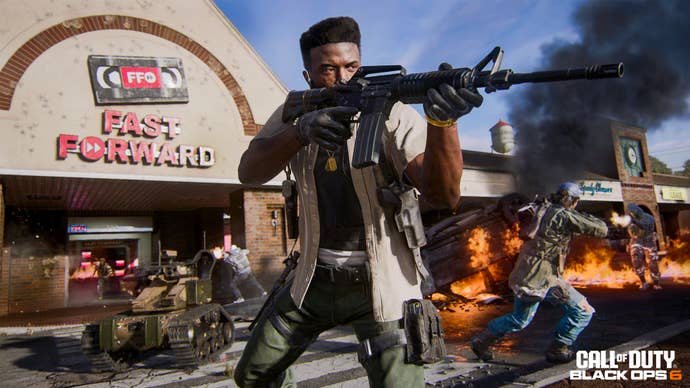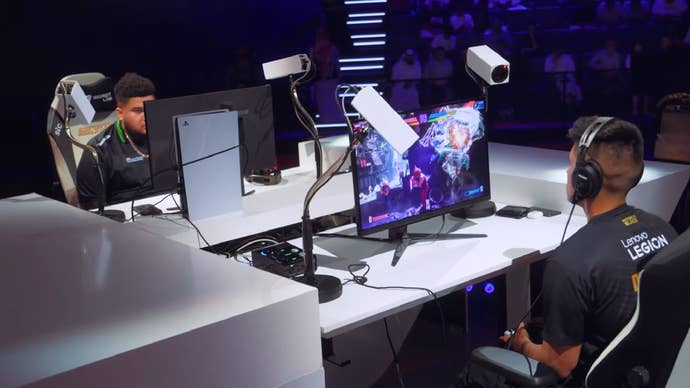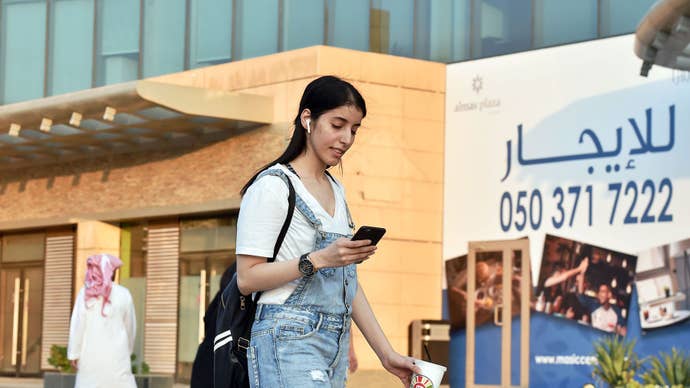"It's about engaging with young people" Olympics sports director speaks on the sporting giant's risky, high-profile leap into video games
We've got 12 years of Olympics Esports to look forward to. But what exactly will that future look like?
Earlier this year, the Olympics committee voted overwhelmingly to authorise the Olympic Esports Games in Saudi Arabia, to run for a whopping 12 years. It marked a massive milestone for the Olympics, which has recently tried to appeal more to younger generations. Esports is its Trojan horse for such a venture. Video games are a big part of younger people's lives, and if the Olympics can stake a claim in the competitive world of gaming, then perhaps it can get younger people to value sport's longest living event.
But such a partnership raises questions. Especially after years of tester events, such as the Singapore Esports Olympics which acted as a test-run of sorts for the concept. That event, while clearly appealing to investors and business people, didn't capture the hearts and minds of gamers at large. But the training wheels are off, the wheels are turning towards a large-scale Olympic offensive on the world of gaming.
How will core Olympic pillars carry over? Will they take a similar approach to fair play in regards to anti-doping, something the esports scene has historically had to battle with, drugs like Adderal used by pro players, being the most famous example. And how will the Olympics ensure everyone is welcome to compete in the Olympic Esports Games when it's hosted by a country with a shaky past (and present) when it comes to gender and sexual equality? To find out, I spoke with Olympics sports director, Kit McConnell.
First, McConnell provided some background on how we got here. According to him, the Olympic committee has been in discussions for around six years, talking to representatives of the esports community. The reason being is that the Olympic Committee is interested in "wider engagement with youth, promotion of Olympic values, and promotion of sport".
Aware there was a lot of passion around the world for esports, it reached out and attempted to figure out a way of bringing both the olympics and gaming spaces together. Fast forward to this year, and the Olympic Esports Games - hosted by the Saudi Arabian National Olympic Committee - was voted through unanimously by members of the board.
McConnell also shared that a survey during the Youth Olympic Games in 2018 found that 80% of athletes were involved in gaming in one way or another. The popularity of gaming and its place in the life of younger generations makes the Olympic's involvement in esports a no-brainer.
VG247: The Olympics Esports Games were announced prior to the Summer Olympics earlier this year. What are your goals for the event?
McConnell: "In terms of goals it's about engaging with young people across the globe. It's about engaging with them to promote the Olympic games, the Olympic values, and sport. With participation following sport, and also recognising and supporting the convergence of technology and sport in esports really brings it together. We've now moved forward with the partnership with the national Olympic committee of Saudi Arabia for a 12 year period, with the goal of having an Olympic esports event probably every two years, to find that balance with the summer Olympic games, esports games, and the winter Olympic games.

VG247: How do you anticipate this event being unique to other events, much like how the Olympic games are distinct from other sporting events?
McConnell: I think we respect the fact that there are a lot of really high level and popular esports games and events already up there. We're not looking to replace them by any means, in the same way the Olympic games aren't looking to replace the football world cup. We're looking to add to that by bringing the best athletes together, giving them a platform - a multi-sport national team platform - where we can celebrate those athletes and those sports. In the Olympics games, what we believe to be the world's best stage, and for esports will be a new stage with a very different proposition allowing them to associate them with the Olympic games and celebrate their status as the best players in their respective games, but as national representatives [...] We're not trying to hijack what already exists. We're celebrating that by giving an additional opportunity to the players and games.
VG247: How are the games chosen? In the Singapore games week, there were very many links between traditional sports and video games with video game versions of Taekwondo and archery. Can we expect the same here?
McConnell: We haven't finalised the program yet, but we currently are aiming for three types of games. Sports simulations, console-based or mobile gaming that are electronic versions of the sport. Fifa or EA sport types of games. Then there will be physical representations of sports - you referenced Taekwondo - so games where you replicate the full physical elements of a traditional sport. Like Zwift or MyWoosh for roadside cycling, as technology develops we foresee more of these. The third type is traditional esports titles, where there is respect for the Olympic values. So a sport-related title or a replication of sport, we know the two converge around games like Rocket League for example, though we're not purely limited to sport-related titles and we'll be integrating various esports titles that respect Olympic values. Not excluding whole games, but adapting them to fit into an Olympic environment.
VG247: What does "respecting Olympic values" mean? I know in the past there's been reservations towards shooting games, Call of Duty for example. So where's the line?
McConnell: In terms of Olympic values we should be clear that's an important part of [this], the promotion of Olympic values, the friendship and respect. This needs to be replicated and we're sure it will be. Where the red line lies is probably in games with direct personal violence built into the content, an example being last year in Singapore we had a partnership with Fortnite, albeit an adapted version with target shooting. So that's a little bit where we see the adaptations that may be necessary to align with values. Other games without those elements we're very open to involvement. But we haven't finalised that definition on where that red line you referenced is, but that example is probably an indicator of elements in games we'd look to adapt where necessary.

VG247: So, targeted violence against other people seems to be the sticking point?
McConnell: Yeah, things like are things we see as not reflecting Olympic values, and if they can be adapted we can obviously have that discussion. And there are other elements we need to look at, in terms of the portrayal of gender and things like that, some of the language elements. At the end of the day we're representing Olympic values, we want to celebrate that with the esports community and the games themselves, but we also need to respect those values.
VG247: You mentioned portrayal of gender, how would that come into play here?
McConnell: Gender equality is very important to us. You probably saw Paris was the first fully gender equal games with the exact same opportunities for female and male athletes to compete at the games. Equally we know this is something we know working with the esports community itself, we can help the development of gender equality in terms of female participation, following, but also portrayal and characterizations. That's not only in esports, we're working very hard on those elements in traditional sports with the international federation. So gender equality for us has many elements, but it also means increased access and participation of female players and everything that goes along with that.
VG247: It's an interesting challenge to figure out I suppose, in terms of games that feature gun violence there's quite a clear difference between Olympic sports and video games. But then again you've got games like Street Fighter where two players are punching each other, while in the Olympics athletes are hitting each other in a controlled capacity. So is it gun violence, specifically?
McConnell: I think that's what we have to look at! You highlight Street Fighter, we had that as a showcasing element last year in Singapore. I think that shows we can work at looking at those elements. Gun violence is one aspect, while combat sports if you'd call it that is another aspect.

VG247: Let's move onto another topic. The Olympics is quite well known for its stern stance on fairness and especially drug testing, to make sure the playing field is fair for all competitors. Esports has had its own history with performance-enhancing drugs, and while testing is present in many events, it isn't in others. Can you state whether or not the Olympic approach to fairness and drug testing will transfer over to the esports Olympics? Or will you take a new approach?
McConnell: It's a really big question, and there are two aspects to it. One is the wider competition manipulation, in Olympic sports there are controls on technology, what is allowed, what isn't allowed. Here we'd clearly be working with publishers to make sure it's a completely fair environment. Being in Saudi Arabia a couple of weeks ago, [I talked] about how some of the games are managed there with dedicated referees and judges, controlling technical equipment, the roles of people outside the team, and so on. This is something that is clearly increasingly sophisticated already within the esports scene for exactly those reasons of fairness and equality. Then coming on to the anti-doping side, it does for us fit in with both fairness of competition and the protection of the health of athletes. That's the balanced approach for the Olympic games, and we'd look to have both education and I imagine elements of testing within the Olympic esports environment. Protection of the health of athletes on the education side, and testing for fairness as you say.
VG247: One final topic, you mentioned numerous times the core Olympic values, and you also mentioned that gender equality is important to you as an entity. The event is to be hosted in Saudi Arabia, and it's no secret the country has a controversial record when it comes to equal opportunities for gender, as well as people of different sexual orientations such as the LGBT+ community. How do you ensure that hosting an event in that country maintains those values, and more importantly how do you ensure competitors who want to represent their country feel safe and secure while doing so?
McConnell: I think we're very confident in that regard on that last point. Equally the partnership with the National Olympic Committee of Saudi Arabia - and we should be clear like the Olympic games the partnership is with the national Olympic committee of the country in terms of the hosting. If you've had the chance to see the presentation from Saudi Arabia at the session, a number of those points were addressed in terms of the advancements of Women's sports in Saudi Arabia. So we go with our values clearly being respected in the hosting environment there as well. And it's a huge opportunity for us in the world of esports to promote gender equality. We wouldn't be going into this without confidence that would be respected both on the hosting side and the Olympic Esports Games.

VG247: There have been steps in the right direction, certainly. But women are still being arrested in the country for standing for equal rights I believe. So, do you have any assurances, any steps you're taking to make sure that the safety element that has been established already at the vote earlier this year follows through?
McConnell: I think we obviously do have confidence in that regard, and we'd be happy to provide further details on that point specifically.
This statement, provided by VG247 following the interview, reads as follows, "On the topic of gender - women’s sport in Saudi Arabia has witnessed rapid growth, with participation now only two per cent behind that of men. There are also now over 330,000 registered female athletes and close to 40 women’s national teams competing internationally. Grassroots sport is flourishing, with sport firmly part of the school curriculum for all girls, as demonstrated by the 70,000 schoolgirls playing in the schools football league each week. In addition to playing sport, reforms to regulations ensure there is female representation on all the boards of all sports federations, with over 100 women now appointed, including seven female federation presidents. A recent reform also means that all female and male athletes receive exactly the same level of pay when on national duty in their sport."
"In relation to your question about hosting in Saudi Arabia, within the context of the Olympic Esports Games and in line with the Olympic Charter, there will be no discrimination against any player on the basis of their gender or sexuality. The NOC of Saudi Arabia is fully in line with the Olympic Charter. The IOC will work with Olympic Esports Games partners to ensure that all athletes/players feel welcome and compete safely in our events. "
_VVjogfa.png?width=690&quality=70&format=jpg&auto=webp)
These strides in sporting are true, and they do paint a picture of progress for the country. This picture does, however, stand in contrast to events happening elsewhere in the country away from Olympic ventures. Earlier this year, women's rights activist Manahel al-Otaibi was sentenced to 11 years in prison for expressing her desire for an end to male guardianship laws in the country, as well as her clothing in published videos and time in public. Members of the LGBT in the country face legal action due to their own expression in the country also. While the gears of progress may very well be turning, some find themselves still punished in spite of it.
Whether or not the Olympic Esports Games can reach its goal of being a distinct, enticing venture in the competitive gaming space, whether it'll retain the same values as the Summer and Winter games, and whether all attendees at such an event feel welcomed are ultimately things that'll be tested over the coming years. In the battle to win over a younger generation of competitive athletes, the International Olympic Committee has stepped into the spotlight. Time will tell if it'll work as intended, and be embraced by gamers worldwide.

